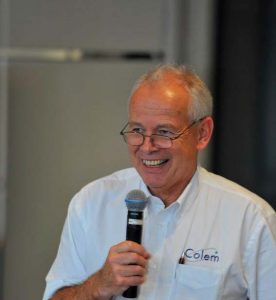
Martin Coleman, Executive Director, Satellite Interference Reduction Group (IRG) summarises the big takeaways from the IRG conference held in Dubai.
In November 2012, a number of key executives from the satellite industry descended on Dubai for three days of discussions about satellite interference at the annual Satellite Interference Reduction Group conference. There were a number of lengthy discussions around the causes and solutions of satellite interference. Here we summarise the ten main takeaways from the conference:
IRG has setup three new working groups at the conference: a. Carrier ID (a restructure of the existing Video & Data groups), b. Deliberate Interference, c. VSAT (Statistics, analysis & “root cause”)
1. The Olympics
The 2012 Olympics was a success, with barely any instances of satellite interference throughout. This is in part due to Carrier ID (it is estimated that around 50% of the Olympic Transmissions had Carrier ID – much higher than expected), but also in part due to better education of the industry and heightened awareness by users.
2. New Carrier ID technology
The new Carrier ID technology (CID) contains the Carrier ID information within a separate spread-spectrum meta-carrier, meaning it is visible to satellite operators, without the need to interrupt the main feed. At the conference, we learnt that this technology will be a formalised DVB standard in January 2013. The industry now needs to work towards introducing this CID technology, with the aim of making it a requirement by January 2015.
3. Carrier ID database
It was discussed that IRG should develop a prototype Carrier ID database. This process was started for the Olympics, but now needs to be developed further to make sure the necessary information can be stored to ensure interference can be rectified quickly and efficiently.
4. Intentional interference
Intentional interference is an area, which has not been focused on too greatly until now. A lot of time was given over to discussing this issue, and there is a general consensus from most of the satellite operators that it is increasing and is certainly not easy to solve individually. However, using better technology and providing accurate evidence can then be used by those authorities that need this vital input.
5. ITU
We heard from the ITU, which stressed the fact that legislation is already in place against intentional interference and that the industry needs to feed the ITU with issues in order that it can support the resolution. It also recognised that better, more coordinated monitoring is required.
6. Pre-empt satellite interference
Leading from intentional interference the conference reconsidered great tools such as Carrier ID and Geolocation but they are reactive. Thus there appears to be a need for predictive solutions and improved monitoring and control.
7. End users
IRG intends to increase its engagement with the end users to gain their full support working, in particular, with the RFI-EUI.
8. VSAT
The Global VSAT Forum (GVF) has been working with the VSAT community to help reduce the interference such systems can cause. GVF initiatives launched include VSAT Installation Training & Certification, Earth Station Testing & Approvals, VSAT Network Validation and VSAT Distributor Benchmarking. There is a real need to support these efforts! So, to that end, IRG shall look at practical technologies and “root cause” statistics, specifically for that community and feed this in the GVF mix.
9. Working groups
IRG has setup three new working groups at the conference: a. Carrier ID (a restructure of the existing Video & Data groups), b. Deliberate Interference, c. VSAT (Statistics, analysis & “root cause”).
10. 2013 IRG annual conference
It was announced that the 2013 IRG annual conference will be held in Rio de Janeiro. IRG was keen to take the conference to Rio, ahead of a number of high profile events taking place there, such as 2014 World Cup and 2016 Olympics. 2012 has been a busy year for the Satellite Interference Reduction Group, but following a packed and lively conference, 2013 looks set to be even busier.












Add Comment